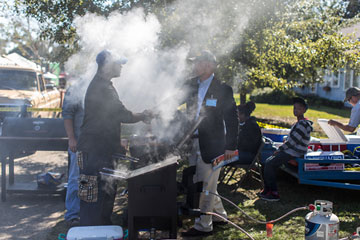
Inside a pine-walled restaurant near Mobile, Ala., the South Baldwin Republican Women's club is watching the party tear itself in two. Between bites of fried chicken and sips of sweet tea, a few dozen ladies and a handful of men clap and hiss as two GOP candidates for Congress savage each other. Bradley Byrne, a mild-mannered former state legislator, has accused Dean Young, a local Tea Party darling, of misusing campaign contributions from "good Christian people." In reply, Young labels Byrne a liar, a coward, a lawyer and, perhaps worst of all, a former Democrat. "You need to learn to tell the truth," Young says. "You don't deserve to go to Congress."
This slice of the South is an unusual setting for Republican combat. Alabama's First Congressional District is God-and-guns country, with three dry counties and modest churches dotting the back roads. Democrat is practically a slur. "We're a very Christian conservative culture," says Becky Vasko, the South Baldwin group's president, of a county where Mitt Romney won 77% of the vote in 2012.
In the wake of October's government shutdown, the uneasy peace between the GOP's hard-right ideologues and business-friendly moderates has given way to open warfare. And the first battle is in lower Alabama, where the party establishment has poured cash into an off-season congressional primary for the seat vacated by Representative Jo Bonner, a center-right Republican who retired in August.
Inside the lobbying shops of Washington and executive suites across the country, the GOP's bundlers and business tycoons have been surveying maps and sketching plans to counter the cohort that sparked the shutdown. Over the next year, they may plow $150 million or more into congressional races in a bid to defend vulnerable allies and unseat truculent Tea Partyers. It is "the classic battle of the Establishment Republicans vs. the Tea Party Republicans," says Young.
At the head of the business brigade is the U.S. Chamber of Commerce, one of the capital's most powerful interest groups. "The chamber is going to run the most robust program in our 101-year history," says Scott Reed, its chief political strategist. On Oct. 29, a week before the runoff, a top chamber official appeared at an aluminum-coil manufacturer in tiny Foley, Ala., to endorse Byrne. "The stakes," says Reed, "have never been higher."
The Empire Strikes Back
This war has the bitter taste of a family fight. As the party's poll numbers plunged to historic lows, a Tea Party organizer blasted out a fundraising e-mail charging that the Republicans who voted to reopen the government "curb-stomped liberty and defecated on the Constitution." A senior official with Americans for Tax Reform, an organization that typically bridges the great Republican divide, tweeted that Tea Partyers were "freaking retarded." The primary season "is going to be a brawl," says Drew Ryun, political director of the Madison Project, a grassroots group backing Tea Party primary challengers in Senate races in Kentucky and Mississippi. "How 2014 goes is going to dictate who is at the top of the ticket in 2016."
